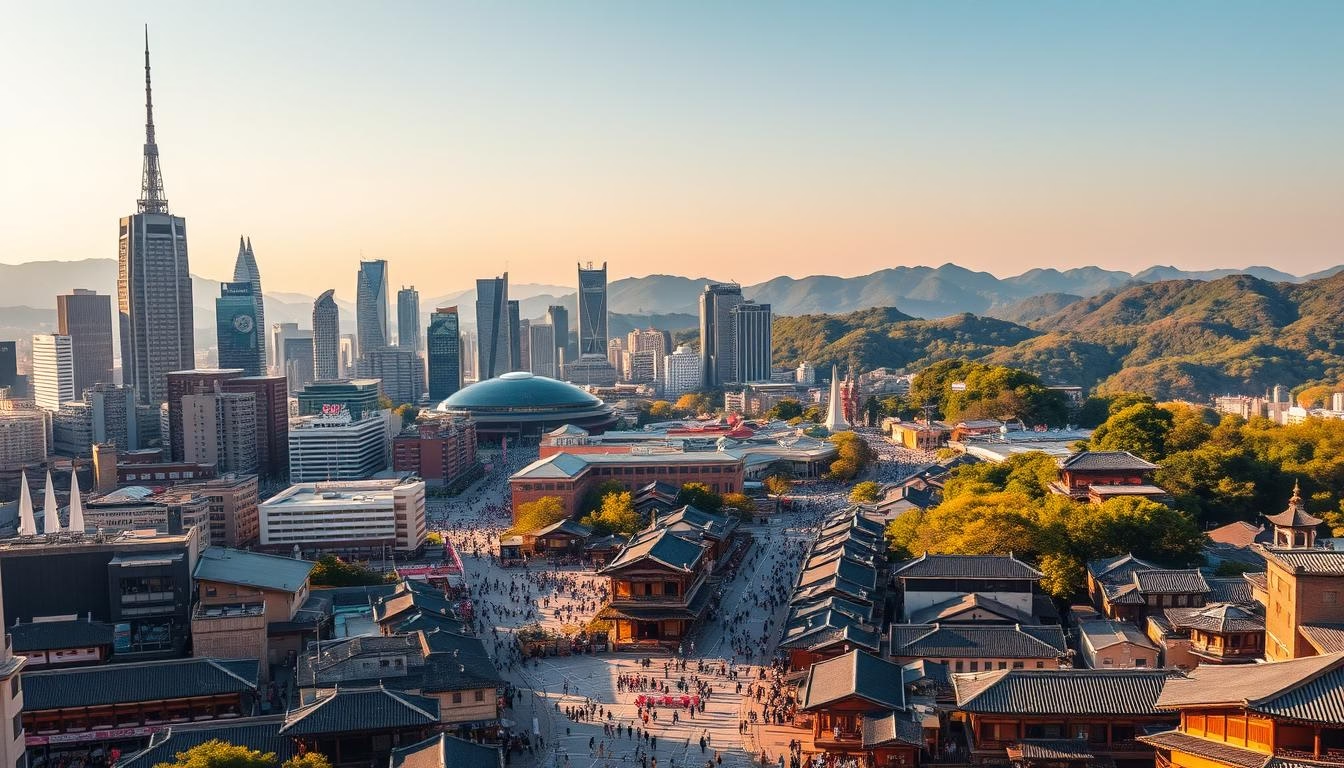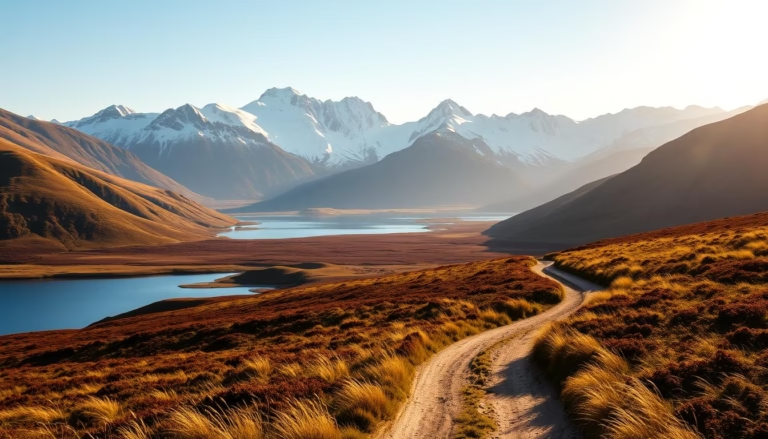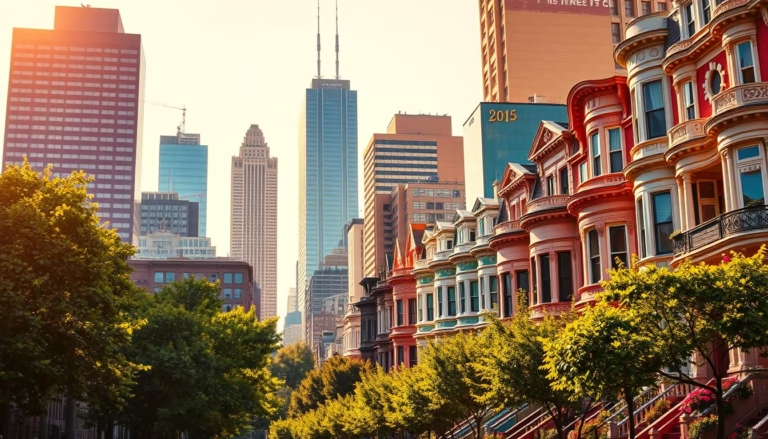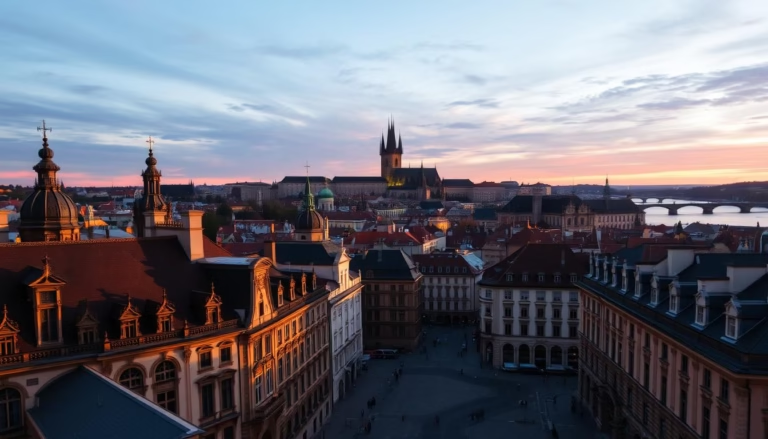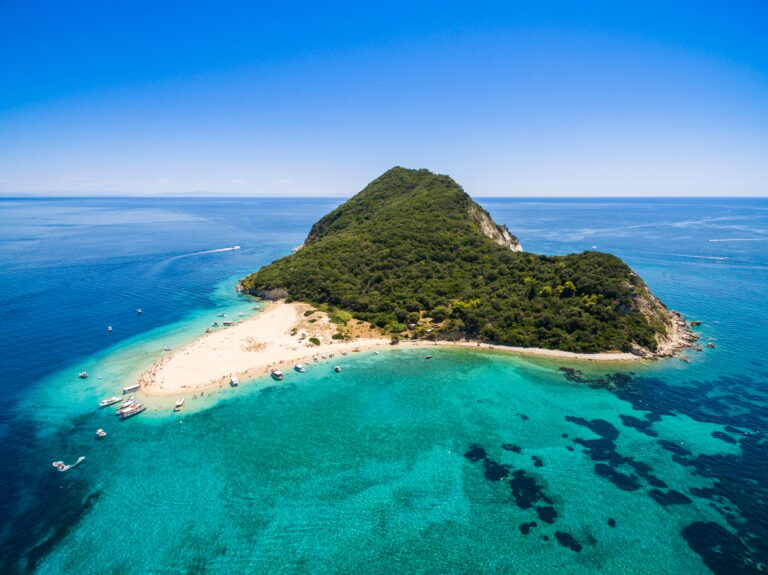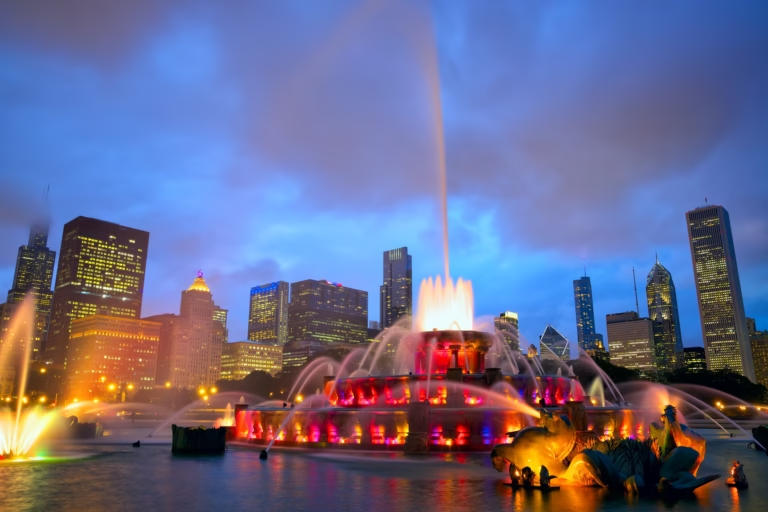Explore the Best Cities to Visit in South Korea
This startling fact highlights the magnetic pull of Seoul’s urban energy while showcasing the country’s remarkable diversity beyond its megacity. Though densely populated areas dominate maps, South Korea’s compact geography – roughly the size of Indiana – packs ancient temples, volcanic islands, and coastal gems into a traveler-friendly playground.
High-speed trains whisk visitors from neon-lit skyscrapers to 1,600-year-old Buddhist sanctuaries in under two hours. You could hike Seoraksan’s autumn-foliage trails at dawn and feast on Busan’s freshest seafood by sunset. This unique blend makes the country a shape-shifting destination where futuristic cities coexist with UNESCO World Heritage Sites.
Our guide focuses on locations offering distinct cultural fingerprints. Discover Gyeongju’s open-air museum of Silla Dynasty relics, where royal tombs double as picnic spots. Explore Busan’s jjimjilbang spa culture between beach excursions. For trip planning inspiration, check out these top destinations recommended by seasoned travelers.
Key Takeaways
- South Korea’s small size enables diverse experiences – mountains, cities, and coastlines are all easily accessible
- Modern transportation networks let visitors efficiently explore multiple regions
- Historic sites like Gyeongju offer living connections to ancient traditions
- Coastal cities provide unique blends of maritime culture and urban energy
- Seasonal attractions range from cherry blossoms to winter sports hotspots
- Distinct regional identities showcase different facets of Korean heritage
Seoul: Where Modern Energy Meets Historical Charm
Walk through neighborhoods where smartphone-toting professionals pass 600-year-old palace gates. This capital city houses 9.7 million residents yet maintains pockets of tranquility between its neon-lit thoroughfares. Four distinct eras coexist here: Joseon dynasty architecture, Japanese occupation remnants, postwar development projects, and cutting-edge tech hubs.
Time Travel Through Urban Landmarks
Gyeongbokgung Palace’s golden-hour glow makes visitors feel royalty. Watch the ceremonial guard change at dawn, then explore the National Folk Museum within its grounds. For sobering modern history, join guided DMZ tours showing North Korean infiltration tunnels.
Bukchon Hanok Village offers Instagram-worthy alleys with traditional tile roofs. Nearby Insadong’s craft shops sell handmade hanji paper goods. Don’t miss Namsan Seoul Tower’s observation deck – sunset views stretch to the Han River.
After Dark Delights
When night falls, the city transforms. Three districts showcase different vibes:
- Hongdae: Student crowds swarm indie music venues
- Itaewon: Multicultural bars serve craft soju cocktails
- Dongdaemun: 24-hour malls meet street food carts
Fuel your adventures with hotteok pancakes from Gwangjang Market stalls. For sit-down meals, Michelin-starred restaurants in Jongno serve updated royal cuisine. Locals swear by late-night sulbing cafes for shaved ice desserts.
Busan: Coastal Culture and Culinary Adventures
Nestled between mountains and ocean, Busan blends maritime heritage with urban energy. As South Korea’s second-largest city, its 3.4 million residents thrive along a dramatic coastline where fishing villages meet skyscrapers. Morning fog often reveals cargo ships gliding past jagged islands, hinting at the region’s deep connection to the sea.
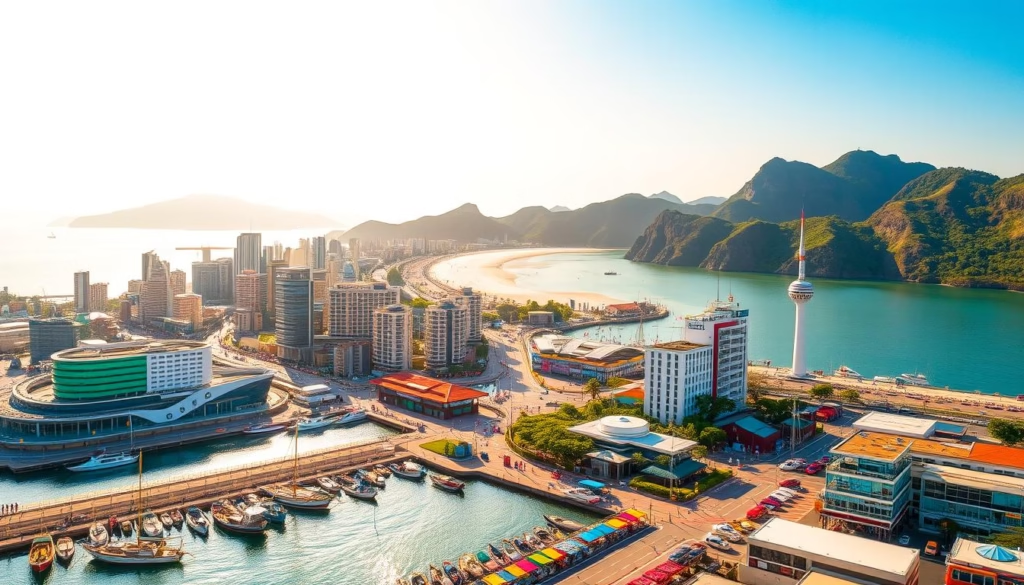
Discover Stunning Beaches and Maritime Markets
Haeundae beaches dazzle with golden sands stretching 1.5 kilometers. Nearby, Gwangan Bridge transforms into a light sculpture after dark. Adventurers hop on Songdo Island’s cable car for aerial views of crashing waves against cliffs.
The Port of Busan buzzes with container ships handling 80% of the nation’s cargo. History buffs explore Haedong Yonggungsa temple, rebuilt in 1970 on wave-battered rocks. Its sunrise ceremonies draw pilgrims and photographers alike.
| Attraction | Highlight | Best Time to Visit |
|---|---|---|
| Gamcheon Culture Village | Art-filled alleys | Weekday mornings |
| Haedong Yonggungsa | Cliffside temple | Sunrise hours |
| Haeundae Beach | Urban coastline | July-August |
| Jagalchi Market | Live seafood stalls | Lunch hours |
Savor Seafood and Traditional Street Eats
Jagalchi market lets you point at squirming octopus for instant kitchen service. Upstairs restaurants serve sannakji (live octopus) with sesame oil dip. Beachside shacks grill jogae gui shellfish over open flames.
Don’t miss Gukje Night Market’s ssiat hotteok – sweet pancakes stuffed with seeds and nuts. For regional specialties, try milmyeon (chilled wheat noodles) at local eateries. Every meal here tastes like the ocean delivered it fresh.
Jeonju: Embracing Korean Tradition and Flavors
Step into a living canvas where curved tile roofs crown centuries-old homes, and the aroma of fermented chili paste lingers in cobblestone alleys. This cultural epicenter preserves Korea’s soul through architecture, food, and artisan traditions untouched by modern haste.
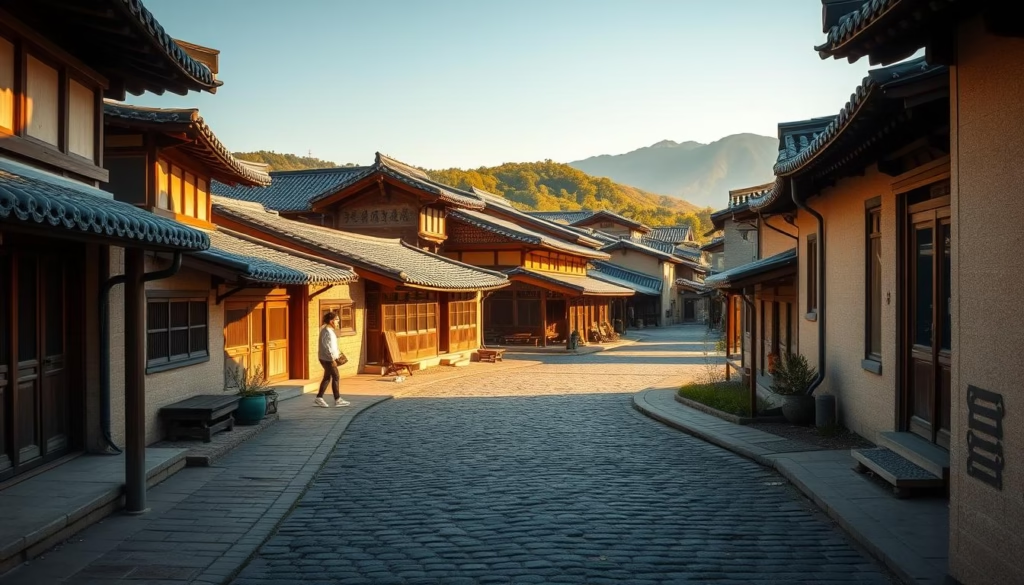
Walking Through Living History
Jeonju Hanok Village feels like stepping into a Joseon-era painting. Over 800 traditional Korean houses line its winding paths, their wooden beams and paper-lined windows whispering stories. Many homes now serve as guesthouses – sleep on heated ondol floors and wake to courtyard gardens.
Taste Creation Where It Began
This city gifted the world bibimbap – that vibrant mix of rice, veggies, and gochujang. Local chefs teach its art in hands-on classes. “The balance of colors and textures reflects our philosophy,” explains a master instructor. “Every ingredient has purpose.”
| Experience | Cultural Insight | Time Needed |
|---|---|---|
| Hanok Stay | Traditional architecture | 1 night |
| Bibimbap Class | Culinary heritage | 2 hours |
| Gyeonggijeon Shrine | Royal history | 1.5 hours |
| Hanji Museum | Paper craftsmanship | 1 hour |
Don’t rush past Gyeonggijeon Shrine’s tranquil grounds. Its portrait of King Tae-jo reveals Joseon Dynasty artistry. Nearby, the Hanji Paper Museum lets you craft durable sheets using methods unchanged since 1392.
Sokcho-si: Nature and Adventure at the Coastline
Where granite peaks meet sea-sprayed shores, Sokcho-si presents nature’s drama in its purest form. This coastal city acts as a portal to wild landscapes and cultural gems, offering both adrenaline-pumping hikes and moments of quiet reflection.
Adventure Through Seoraksan National Park
Seoraksan’s jagged ridges glow crimson each fall, drawing hikers to trails like Ulsanbawi Rock. The UNESCO-listed park shelters rare species like Korean musk deer. “Climbing here feels like walking through a painted scroll,” shares a local guide. Crystal streams cut through valleys where ancient temples cling to cliffs.
Unwind at the Peaceful Sokcho Beach
Gentle waves polish pebbles along this serene stretch of coast. Unlike busier beaches, the wide shoreline invites barefoot walking at sunrise. Summer brings families splashing in turquoise waters, while autumn offers solitude under migratory bird formations.
| Attraction | Unique Feature | Ideal Time |
|---|---|---|
| Abai Village | North Korean refugee heritage | Evening |
| BTS Bus Stop | Iconic photo spot | Golden hour |
| Daepo Port | Fresh squid auctions | 5-7 AM |
Don’t miss Abai village’s savory sundae sausages – a taste of resilience. K-pop fans snap photos at the BTS Bus Stop, framed by ocean views. Whether chasing waterfalls or watching fishing boats bob, Sokcho-si proves why this country captivates outdoor lovers.
Gyeongju: Dive into Korea’s Ancient Heritage
Time seems to slow its march in this city, where grassy burial mounds hide royal secrets and stone pagodas whisper tales of the Silla Kingdom. Gyeongju’s nickname as the “museum without walls” proves true at every turn – you’ll stumble upon 1,000-year-old relics while biking between rice fields.
Walk Among Kings and Astronomers
Daereungwon’s tomb complex lets you peek into Silla royalty’s afterlife. Cheonmachong’s excavated gold crown dazzles, but the real magic lies in Wolji Pond’s moonlit views. By day, it’s a tranquil garden; by night, the reconstructed palace buildings glow like amber.
Where Faith Touched the Sky
Bulguksa Temple stands as a UNESCO World Heritage Site, its stone staircases symbolizing Buddha’s journey. Don’t rush past the lotus-shaped carvings – each tells a story. A short hike reveals Seokguram Grotto’s serene granite Buddha, gazing seaward since 774 CE.
The Gyeongju National Museum houses treasures that make textbook history tangible. From celestial maps at Cheomseongdae Observatory to artisan villages keeping old crafts alive, this place offers more than a glimpse – it’s a full immersion into Korea’s golden age.
